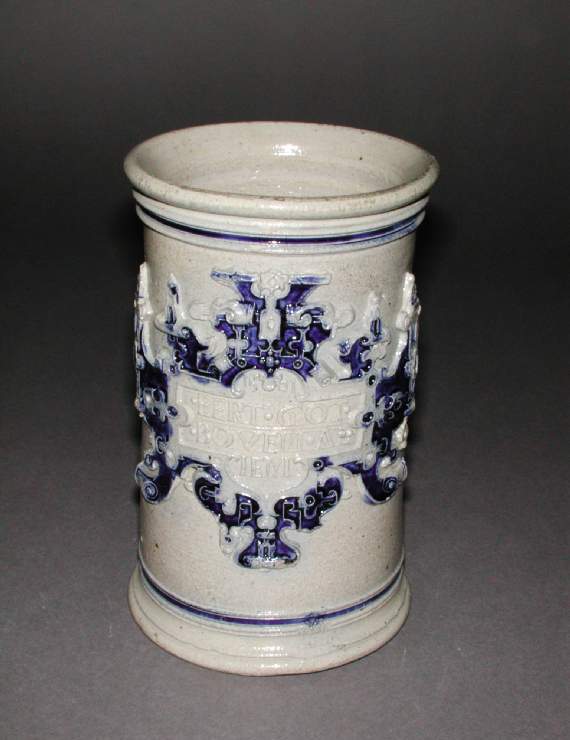Current Location: Gallery 27 (Glaisher)
Maker(s)
Production:
Emens, Jan
Entities
Categories
Description
Grey salt-glazed stoneware with relief decoration painted in blue. On the front is an elaborate frame enclosing an inscription in relief, '1591/'EERT.GOT./ BOVEN. AL/IEM' (1591/HONOUR GOD ABOVE ALL/ potter's initials)
Grey stoneware, thrown, with applied moulded decoration partly picked out in cobalt- blue under salt-glaze. The cylindrical jar has turned bands around its base and top, and a projecting rim at the top. On the front is a rectangular cartouche surrounded by an elaborate Mannerist style frame comprising scrolls, strapwork, and architectural elements, partly picked out in cobalt-blue. Within it is the raised inscription, '1591/'EERT.GOT./BOVEN.AL/IEM' (1591 HONOUR GOD ABOVE ALL and the potter's initials).
Notes
History note: Bought in Andover many years earlier by John Bowden, Wardour Street, London, from whom bought on 31 May 1894 by Dr J.W.L. Glaisher, FRS, Trinity College, Cambridge
Legal notes
Dr J. W. L. Glaisher Bequest
Measurements and weight
Height: 16.3 cm
Acquisition and important dates
Method of acquisition: Bequeathed
(1928-12-07)
by
Glaisher, J. W. L., Dr
Dating
16th Century, Late
Production date:
dated
AD 1591
Note
Few Raeren pharmacy jars have survived in comparison with tankards and jugs. Their forms were derived from Italian maiolica jars, and Emens was probably inspired by seeing Italian style examples made by Antwerp potters. This jar has a simple cylindrical form with a projecting rim which would have made it easy to tie on a cover. Other examples have gadrooning round the shoulder and lower part which imitated the decoration of Italian maiolica jars more closely. The elaborate frame comprising scrolls, strapwork, and architectural elements is typical of Mannerist style frames of the second half of the 16th century. The inscription on this jar is not associated with physical health, but a jar in the British Museum is inscribed in German, 'These contents will make the gentlemen and highnesses sing with praise, and restore the health of he sick'. Some jars may have been used for non-medical purposes, such as the ingredients of cosmetics. Although Raeren is now in the province of Liège in Belgium its stoneware is usually treated as German stoneware in publications.
School or Style
Renaissance
People, subjects and objects depicted
Components of the work
Decoration
composed of
cobalt oxide
Surface
composed of
salt-glaze
Base
Diameter 10 cm
Rim
Diameter 10 cm
Materials used in production
grey
Stoneware
Techniques used in production
Throwing (pottery technique)
Inscription or legends present
Inscription present: letters and stops in relief within a moulded frame
- Text: 1591/.EERT.GOT/.BOVEN.AL/IEM
- Location: On front
- Method of creation: Moulded in relief an applied
- Type: Inscription
References and bibliographic entries
Identification numbers
Accession number: C.2036-1928
Primary reference Number: 73034
Old object number: 2080
Stable URI
Audit data
Created: Saturday 6 August 2011
Updated: Tuesday 30 April 2024
Last processed: Tuesday 15 July 2025
Associated departments & institutions
Owner or interested party:
The Fitzwilliam Museum
Associated department:
Applied Arts




